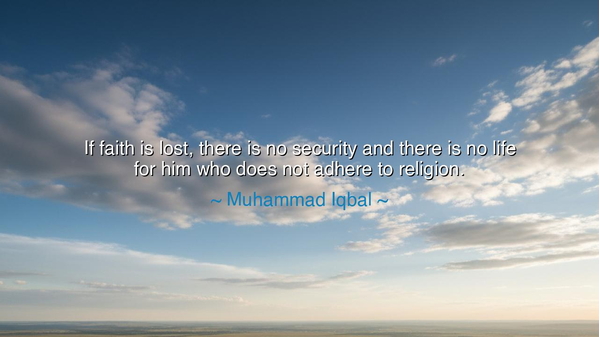
If faith is lost, there is no security and there is no life for
If faith is lost, there is no security and there is no life for him who does not adhere to religion.






"If faith is lost, there is no security and there is no life for him who does not adhere to religion." These profound words from Muhammad Iqbal, a philosopher and poet, emphasize the central role of faith and religion in a person’s life. Iqbal argues that without faith, life lacks a sense of purpose, security, and meaning. Religion, in his view, is the foundation upon which a person's inner world rests, offering both spiritual guidance and a sense of grounding in the tumultuous sea of life. To lose one's faith, to abandon the core principles and values that religion provides, is to lose one's way in the world, to live adrift without a compass to navigate the storms of existence.
The origin of Iqbal’s thought lies in the ancient and timeless idea that faith provides the bedrock of life. In Greek philosophy, figures such as Plato and Aristotle explored the importance of virtue and the moral compass that guides human action. Plato, through his works, suggested that the soul is best aligned when it seeks the higher truth, often represented by a divine force or rational principle. Similarly, in Eastern philosophies, including Hinduism and Buddhism, faith and adherence to spiritual teachings are seen as vital for inner peace and the ability to live in harmony with the world. For Iqbal, this notion is carried forward into a modern context, where faith is not merely a set of beliefs but a transformative force that shapes the individual and the community.
Consider the life of Socrates, who believed that without virtue and righteousness, one could not live a fulfilled or meaningful life. His commitment to the truth and his steadfast belief in the divine guidance led him to question the societal norms of his time. Even when faced with death, Socrates held onto his belief that life without faith in truth and morality was not worth living. His faith in his principles allowed him to stand unwavering, even as he drank the poison that ultimately led to his demise. In a similar vein, Iqbal saw faith as something that sustains the individual through adversity, guiding them toward security and meaning, just as Socrates' belief in virtue sustained him through his own trial.
Another example that reflects Iqbal’s sentiment is the life of Nelson Mandela, whose faith in justice and human dignity gave him the strength to endure 27 years in prison. While Mandela did not adhere to a single religious tradition in the same way Iqbal described, his faith in human rights, his belief in the possibility of a free South Africa, and his spiritual commitment to equality sustained him through immense suffering. Like Iqbal’s assertion that faith is the bedrock of security, Mandela's sense of faith—in humanity and in his cause—was what gave him the strength to endure and ultimately bring freedom to his people. Without this deep inner conviction, his journey would have lacked the resilience required to overcome such formidable obstacles.
The lesson from Iqbal’s words, though rooted in religious thought, speaks to a universal truth: without faith, human beings are lost. Whether that faith is in a religious doctrine, a moral philosophy, or a cause that transcends personal gain, the sense of security and purpose that faith provides is indispensable for navigating life’s storms. In the absence of faith, one is left to drift, vulnerable to the chaos and confusion of a world that often lacks clear direction. Iqbal’s message calls us to nourish our faith, to hold fast to the principles that give us strength and purpose, so that we may live lives of integrity and meaning.
In practical terms, to embody Iqbal’s wisdom, we must seek out what gives us faith and strength. For some, this might mean returning to the spiritual practices of their faith; for others, it might involve finding a moral compass or a vision that gives their life direction. Whatever the source of our faith, it is essential that we cultivate it consistently, nurturing our belief in something larger than ourselves. In doing so, we find not only security but also the courage to face life’s challenges with grace and strength. Like Socrates, like Mandela, and like countless other historical figures, our faith is what can carry us through the most difficult trials, helping us to stay true to our purpose.
Ultimately, Iqbal’s insight teaches us that life without faith—whether religious or moral—is like a ship without a rudder, adrift in an uncertain world. Faith, when embraced, provides us with the direction we need to navigate the challenges of life. It is not merely about belief, but about the transformative power of faith to guide our actions, shape our character, and give us security and purpose in this ever-changing world. Let us, therefore, hold onto our faith, whether it is in religion, justice, or love, as the key to living a life of meaning and strength.






AAdministratorAdministrator
Welcome, honored guests. Please leave a comment, we will respond soon